For some bands, timing is everything. The recording industry snatches up some artists in the prime of youth, and the chaotic emotions and stresses that go with it end up being shaped into some of pop culture’s most influential and vibrant music. And, almost as a byproduct, their traditional paths into adulthood (as well as their comfort zones) are completely hijacked—with high school substituted by rock-stardom.
That was the case for Kittie, the Canadian all-girl metal band founded in 1996 by sisters Morgan and Mercedes Lander (lead vocals/guitar and drums, respectively) and Fallon Bowman (vocals/guitar), joined shortly after by Tanya Candler (bass). They were 14, 13, 12, and 13 years old. In 2000, they received an RIAA gold certification for their debut album Spit—which shipped almost two million copies worldwide—before any of them had received their high school diploma.
“We were just playing in the basement, having fun. We always joked, ‘Oh, when we go on tour…’ but everybody does that, everybody has their dreams, right?” says Morgan Lander, now 36. “Now I can look back and say I understand the gravity of what was going on, but then, we really didn’t have the emotional ability to truly grasp what was happening.”
That matured perspective, as well as the pure survivalist victory of running a band that’s lasted 20 years, led them to create Origins/Evolutions, a three-disc set containing a documentary and a live album that was released in March 2018.
Throughout their career, Kittie has played with five bassists (Candler, Talena Atfield, Jennifer Arroyo, Trish Doan, and Ivy Vujic) and four guitarists (Bowman, Jeff Phillips, Lisa Marx, and current guitarist Tara McLeod), and worked with four producers (Garth Richardson, Steve Thompson, Jack Ponti, and Siegfried Meier) to make six full-length albums. That Kittie “family” is very much celebrated by the band’s remaining members, the Lander sisters and McLeod, and the memory of their late bassist Doan, who died suddenly last year, lives on through the music they made with her for more than a decade. In an interview with Morgan Lander and McLeod, they spoke frequently about the value of their lasting relationships in music, and the pains and joys that went into two decades of Kittie.
How does it feel to be releasing a documentary about your career?
Morgan Lander: As a band, I like to say we made it. We’re celebrating the 20-year anniversary and we made a documentary about it, and people actually care. As a band that’s the ultimate.
How was the 20th anniversary show?
Lander: The show felt like a culmination of all the work that I’ve done and that we’ve done. I had approached everyone with the idea, and everybody gave a resounding “yes.” Tanya [Candler], our original bass player, had to get an okay by her doctor because she was six months pregnant at the time. So, she was rocking out playing with her bass—it was awesome. We were like, “Don’t jump too high!” [Laughs.] After all these years having not stood on the stage with some of these girls, the chemistry is still there and it reminds you why you started. Everybody was on a high that night.
—Morgan Lander
Tara McLeod: It was so magical. Everyone just knew how important this was. There were people flying in from all over the world—these fans that we’ve been friends with for years. The support and the love was amazing. I remember standing out in the crowd when they were doing [material from] Oracle, so it was Jennifer [Arroyo] and Jeff [Phillips] jamming with them. And I remember just being blown away by how good they sounded!
Did you gain any unexpected insights from watching the documentary about the band’s history?
Lander: For me, realizing just how young we were. Now, being 36 years old and looking back, it’s beneficial to have all that time pass to see how I might’ve acted differently. There’s a lot of redemption and forgiveness that’s involved in this as well, because there were a lot of girls in the band that left and not always on great terms. It’s all about healing and celebration as much as it is about the fans and the music. I’m glad it opened a dialogue and there was a lot of peace involved in all of that.
Other than the significance of the date, what was the motivation behind making the documentary?
Lander: In a way, it sums everything up; it puts a nice cap on things. If there was never going to be another Kittie album, I think that this would be a great way to say, “Well, it’s been a great ride, we may not do this professionally 24/7 anymore, but we can look back and say it was all worth it.” I don’t think that when we set out to do it, that the healing aspect and catharsis was something I was expecting—but I’m certainly glad it happened.
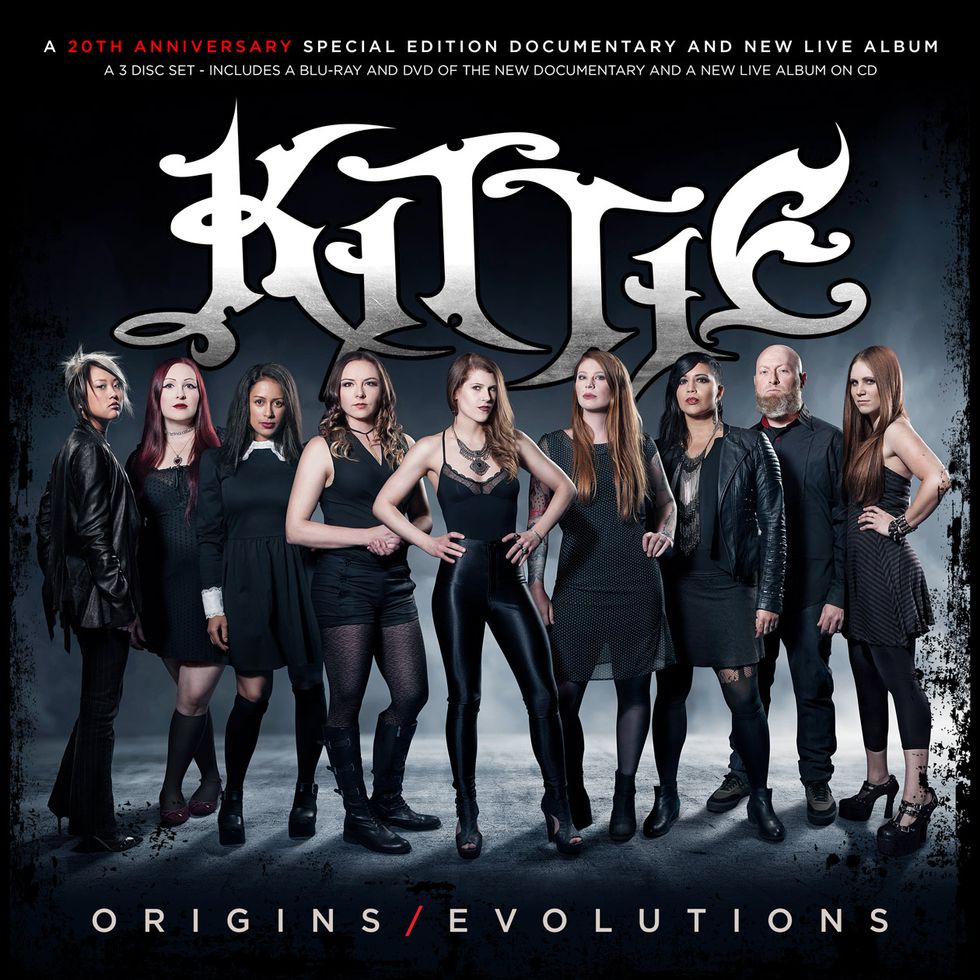
TIDBIT: To mark two decades as a band, Kittie released Origins/Evolutions, a three-disc live album and documentary. In celebration of this mile marker, Kittie reunited former members to play material from the band’s six studio albums in a special concert in hometown London, Ontario.
How did you first get into playing guitar?
Lander: Originally, I took piano lessons. It wasn’t until I was about 10 or 11 years old that I started to get into guitar. My musical tastes changed to more guitar-driven rock ’n’ roll. I took classical lessons for a little while when I was younger, but mostly when I got back into it from the age of 12, I went to a guy who just taught me basic theory. He was a big metal guy. He liked Anthrax and GWAR, so I was like, “This guy likes cool music.” It seemed like it was fun for him, too.
McLeod: I started pretty much in the traditional way: 12 years old, I got my first guitar and went to guitar lessons. I was really lucky. I had a guy who was still in high school and he basically changed the direction of my life by giving me the album Jar of Flies [by Alice in Chains] and I would’ve never ever listened to that. He just made me fall in love with the instrument because he taught me things that I really wanted to play. I felt lucky because he was pretty strict on me practicing, but he also went about it in a way that I would continue playing guitar, whereas a lot of my friends started out the same time as me and ended up quitting.
Morgan, you were just 14 when the band took off. Everything exploded so quickly—it was like you guys grew up in studios and on stages. What was that like?
Lander: It’s been a really interesting life, let me tell you. Honestly, it was a strange time. The album got released and it was really big, and it was like suddenly everything we knew was gone—our lives were forever changed. We were on tour with people twice our age. We were super naïve, enthusiastic, and probably very annoying as well, because we were kids who were genuinely living our dream. You’re trying to figure out who you are as well as navigate the teenage emotions that come with that, but you’re also doing it while you have an audience and critics. It can be very hurtful—a lot of people had a lot of nasty things to say and it was hard on us.
How important do you think your youth was to your success?
Lander: It certainly added an aspect of energy and attitude that I probably wouldn’t be able to keep up with now or even 10 years ago. Especially with the first album, that whole attitude we had going on was 100 percent youth. It would be different if we had started later in our lives. It was the perfect storm.
In the film, you mention a lot of the criticism you faced for being an all-girl metal band. What was it like dealing with that?
Lander: Especially then, during the early 2000s, it all felt very anti-female … “bro” culture. The first few tours we did, we felt like we were having to prove ourselves. We’d be setting up and there would be a crowd full of people with their arms folded, like, “What are we about to witness?” Luckily as a band, even back then, we understood our power. We knew that when we started playing that people’s minds were going to be changed—it’s just that we had to go out and do that.
McLeod: I’ve been very lucky. When I joined Kittie at 21, it was already established, and those girls had already been through so much of that stuff. I’ve played gigs where I showed up at the venue and the security tried to kick me out. I get that sort of thing often, or like walking onto a stage and someone goes, “What are you doing?” That sort of thing happens all the time. It’s annoying, but if that’s the worst thing I have to deal with, I’m alright with it. I usually end up becoming kind of one of the boys, I guess. But I think that speaks highly of the musicians that I’ve had the pleasure of working with.
Frontwoman Morgan Lander played Gibson Gothic Vs on tour supporting Kittie’s 2000 debut album, Spit, but now she plays Hamer Vector models live and in the studio. Photo by Neil Zlozower
Women do seem to increasingly have more of a voice these days.
McLeod: They certainly do. And especially in Canada, all the female metal musicians, we’re all very connected and we’re all very close friends. It’s this nice little network of women who support each other, and everyone goes through the same experiences and it’s good to have those friends. And people expect us to butt heads, but it couldn’t be more the opposite.
Lander: I long for the day when maybe it doesn’t have to be an issue—when a woman in a band isn’t like a token woman in a band. Obviously prior to that, the dialogue needs to continue to happen for people to be aware that that’s what’s happening. But one day when it doesn’t have to be a focus, it doesn’t have to be pointed out—I long for that day.
How did you originally become personally connected with metal?
Lander: When I was 12 years old, my family moved. We left all my friends, everything I had known, and my personality started to change. I was angry and I felt like I didn’t know how to express it, and metal music was able to encapsulate the way I felt. I was a pretty angry young person. We had a great upbringing, but there was just something inside of me that was always stirring, like a tornado. When we decided to start the band, I didn’t really think, “Well, I’ll be the singer because I know how to sing.” Nobody else really wanted to do it and I volunteered because I felt like I was angry enough that I could.
like a tornado.” —Morgan Lander
You mean like screaming, in particular? That takes both guts and commitment to pull off.
Lander: Absolutely, yeah. Because it’s not something you’re perfect at right away, especially the true form of screaming where you’re not going to hurt yourself. That takes years to get the technique down. It’s weird though, because since I’ve been doing this for so long now, the screaming thing comes naturally to me and the singing aspect is the thing I had to work on that doesn’t feel all that natural.
Tara, how did you get into metal?
McLeod: I really started getting into metal when I started jamming with the girls. It was a very eye-opening experience joining Kittie, because [it introduced me to] some of these bands that I hadn’t even given a chance. But just to get into it by playing it was a pretty neat experience. I feel that to really understand the genre you have to either see it live or play it live. There’s just something incredible about that. Also, the metal community is very open. In my experience, they’re very non-judgmental; you can be who you are, and whatever you want to be. For a lot of fans, they probably were kids growing up getting bullied at school and that was their outlet. I think metal is exceptional for inclusivity. I play a whole lot of genres because I work as a hired hand, and I feel most connected with fans while playing metal.
Heavier genres do seem to involve more of a social catharsis.
McLeod: Yes. I would understand if maybe sitting in your bedroom at night listening to metal doesn’t seem like a party. But when you get to an actual show and have people around you and the music and the energy with the room, a lot of times you can be connected to the band, because they’re not going to be in an arena. And there’s not going to be that photo pit in the way, and you can get up to the stage and have a sort of interaction. I’ve had plenty of interactions with fans while playing.

Guitars
Hamer Custom Vector 2005
Various Hamer models
Amps
Mesa/Boogie Triple Rectifier
Mesa/Boogie Dual Rectifier
Mesa/Boogie Road King
Mesa/Boogie Rectifier 4x12 Slant cab
Strings, Picks & Accessories
Dunlop Jazz III XL picks
D’Addario EXL117 (.011–.056)
Boss NS-2 Noise Suppressor
Boss TU-2 Tuner
Going off of that live aspect, does that feed into the band’s approach in the studio?
Lander: Absolutely. I would say as a band we’ve been very basic when it comes to live setup and also in the studio. We’ve always been big fans of sounding polished in the studio, but not like something that you can’t pull off live—so you can go to a show and say, “That sounds just like the album.” Because it’s just an extension of that studio album, the live aspect, with all the energy that comes along with it. We have, in the past, experimented with longer recording processes by adding a lot more harmonies and a lot more guitar layering, and that sort of thing. But I always felt like those albums never felt like who we were. At our core, I think we’re just a raw, organic metal band, and I love for that sound to be captured.
Like on Funeral for Yesterday?
Lander: Yes, definitely. And I mean, I love the songs on Funeral for Yesterday. I think the songwriting is some of our best work. I just think that production-wise and the way that it was recorded, it didn’t end up sounding the way I had hoped.
McLeod: That experience was a little tense. But after that we’ve worked with our good friend Siegfried Meier.
You guys have worked with a lot of producers over the years. Who was your favorite?
Lander: Our first two albums [Spit, Oracle] were recorded with Garth Richardson, who’s a huge name in the metal and rock world. That was our very first recording experience. He rolled up with a semi-truck and unloaded all this crazy gear, and we were like kids in a candy store. We got to play on some gear that was worth tons of money—stuff that was way older than we were. Those first two albums really set the bar high. But, I will say Siegfried Meier is my favorite producer to work with. [Editor’s note: Meier was second engineer on Oracle, and producer on In the Black and I’ve Failed You.] We always have a great time; the vibe is great. You can have your gear, you can have whatever, but if you’re not having a good time, that can show up in the music.Sig’s a good dude and he knows exactly who we are as a band and what we want. I feel like that’s the redefinition of Kittie.
And that’s interesting, too, because you were able to pull someone out of your past, after the band has changed so much, and discover this deeper relationship with them.
Lander: Yeah, absolutely. It all came full circle. He’s a big part of who we are as a band now.
McLeod: Every time we go into the studio with him, it’s just the most ridiculous, hysterical situation ever. He has a real gift for keeping the mood of the studio positive, and it’s like hanging out with your friends all day, laughing your ass off, and doing what you love. The best recording experience I’ve ever had is with Kittie, because it’s just a party. And I don’t mean booze or anything like that—it’s just laughing and drinking tea.
Tara McLeod’s preferred guitar is a PRS Custom 22, but she often plays a goldtop Les Paul with Kittie. “I take the lacquer off the back of the neck of my guitars, she says. “Every single guitar I own has the lacquer stripped away.”
Photo by Jose L Pimienta
What is your songwriting process as a band?
Lander: When we started, it was a lot sloppier and quicker. We used to have a rule: “If we’re not happy with it in 20 minutes, let’s move on.” That sounds crazy, right? But as kids, our minds were everywhere. Over the years, we’ve taken that basic foundation and really worked at it. And so, if we’re not satisfied with something, we can get together at another time and rewrite, and then come back together to discuss things and jam it out. We’ve always done our best work when we have that chemistry together in a room. Rather than sending stuff over email or that sort of thing … I’ve just never been good with that.
With your guitar parts, do you prefer to plan ahead or improvise?
McLeod: I prefer to be prepared. On my first Kittie recording experience [In the Black], our producer Jack Ponti didn’t want it to be planned—he wanted it to be off-the-cuff. So, a lot of my parts were rejected and he’d be like, “Okay, I’m going to run the track—just jam along with it.” Which, you know, does get some good stuff because you get your happy mistakes there, but I do like to put some thought into it. Outside of Kittie, I do write pop songs and I have my riff library in my computer. I’m mostly a hired player; I play for pop artists and do songwriting.
What are your go-to guitars?
Lander: I’ve been playing the same guitars for years. I started out playing with the Gibson Gothic Vs that they put out around 1999 or 2000. I have several Hamer Vectors and I love those guitars. I think they sound amazing. Since I got them, I record exclusively on our albums with them and play them live. I have a lot of different guitars and Hamer has always been my go-to.
McLeod: I have an endorsement with PRS, so I have a Custom 22. But I also play a goldtop Les Paul depending on what tone I want. If I want to be a little more diverse, I’ll use the PRS because I can get an assortment of tones out of it, whereas the Les Paul is the Les Paul. I take the lacquer off the back of the neck of my guitars. Every single guitar I own has the lacquer stripped away, and I find PRS is exceptionally sticky back there. It makes it feel like silk, if you get that off.
What’s your rig setup like?
Lander: We’ve been playing exclusively Mesa/Boogie pretty much since we started touring, so that’s my preference. I have a Dual and a Triple Rectifier, and also a Road King. I have played all three of those on and off, but usually the Triple is my go-to. I just really appreciate the power and the sound that I’ve come to associate with what I want the band to sound like.
McLeod: I do enjoy using the digital amplifiers, like Axe-Fx and the Kemper Profiler, in the studio. But I’m always going to be a bit of a purist. I like real amplifiers. I like the sound of real stompbox pedals. That’s my go-to. On the last few gigs that I’ve had, it’s been required that I use real gear as opposed to Axe-Fx, and that’s really nice because I do prefer it. With Kittie, we always use Mesa amplifiers.
I don’t really use a whole lot of effects with them because it’s basically a straightforward metal sound with a couple of effects in there. But now I’m scaled back to a Mesa/Boogie Express 5:50, which is nice, because combo amps are excellent because they’re small. It’s the amplifier that I’ve got the most compliments on for its clean tone. Everyone thinks Mesa is just metal, but they have beautiful, beautiful clean tone.

Guitars
PRS Custom 22
Gibson Les Paul goldtop
Amps
Mesa/Boogie Dual Rectifier
Mesa/Boogie Express 5:50
Marshall JCM900 Lead 1960 4x12 cab
Effects
Xotic EP Booster
Fulltone OCD
Keeley Compressor
MXR EVH Phase 90
Cusack Tap-A-Delay
Vox wah
Strings and Picks
Jim Dunlop Jazz III picks
D’Addario (.010–.056)
How about pedals?
McLeod: EarthQuaker Devices makes a pedal called the Ghost Echo. I absolutely love it, because I play with a shoegaze band sometimes and that’s my tone for that band. It’s amazing. I’ve got the MXR EVH90 Eddie Van Halen phaser, which I use a lot. I think the secret is, I keep an Xotic EP Booster on my board, and I just keep it on. I don’t actually use it as a boost.
Morgan, what’s it like working with your sister? Tell us more about your relationships with your bandmates.
Lander: Because we grew up together and grew up playing together, Mercedes and I have a weird thing that—you just know. When you’ve played with someone for as long as we have, it just clicks, it makes sense. You know what the person’s next move is going to be. Tara is such a fabulous guitar player and is so invested in her instrument, and she also likes all different genres of music. She’s one of my best friends. When she joined [in 2005], it added a really amazing element that I think was lacking—it can get stagnant after a while, people with the same ideas. I think it was integral to the evolution of the band.
McLeod: On the creative side of things, Morgan and I are very comfortable with each other because we’re both naturally very shy. We just don’t feel any sort of embarrassment showing each other an idea. And that makes for a much more relaxed writing session.
Morgan, as a lifelong metal fan, what do you listen to these days?
Lander: I really dig Chelsea Wolfe and stuff like that. Her new album is pretty sweet. I’ve actually been listening to a lot of synthwave. I don’t think I’m nearly as angry as I used to be [laughs]. It’s a different vibe. It’s kind of guitar-driven—Dance with the Dead, Mega Drive, Perturbator.
Do you have any music in store for the future?
Lander: That’s a good question! I don’t know that we’ll do another studio album. I think the possibility is always there. In revisiting the things that we’ve been through in making the documentary and playing the 20th anniversary show, it has reignited our passion for the band. While we’ve all gone our separate ways, there’s a piece of Kittie in all of us, and it’s something that will never truly die—so never say never. There’s a possibility of another show like that at some point. I guess time will tell.
Morgan, as a founding member, how have your goals changed over the years?
Lander: Personally, I feel like a less selfish person. I just want to be happy. I continue to make music with friends and I talk to all my Kittie bandmates and ex-bandmates quite often. For a long time, I’ve felt that making music and trying to continuously prove everyone wrong and “make it” in the industry has been really taxing. And sometimes it does take the fun out of what originally was supposed to be a fun thing. So, my goals are getting back to the basics of: I want to have a good time, and make music that I’m passionate about and feel good about.
Fronting an all-girl metal band in the ’90s was not easy. How do you feel being someone who young women look up to?
Lander: It’s a weird thing for me, for people to say, “Your experience is interesting,” or “Your experience matters.” But I’m learning more and more that it does, and I think it’s important to be able to tell that side of things. Hey, but, every experience is relevant, you know? It’s all part of it.
Onstage in Colorado Springs in 2011, a snarling, ferocious Kittie tours behind their I’ve Failed You album.
In the decade when grunge hit its peak, an aggressive, in-your-face metal act like Kittie was just what the public wanted. Here, the band performs “Charlotte,” the second single from their debut album Spit, with a sound that resonated with audiences worldwide.




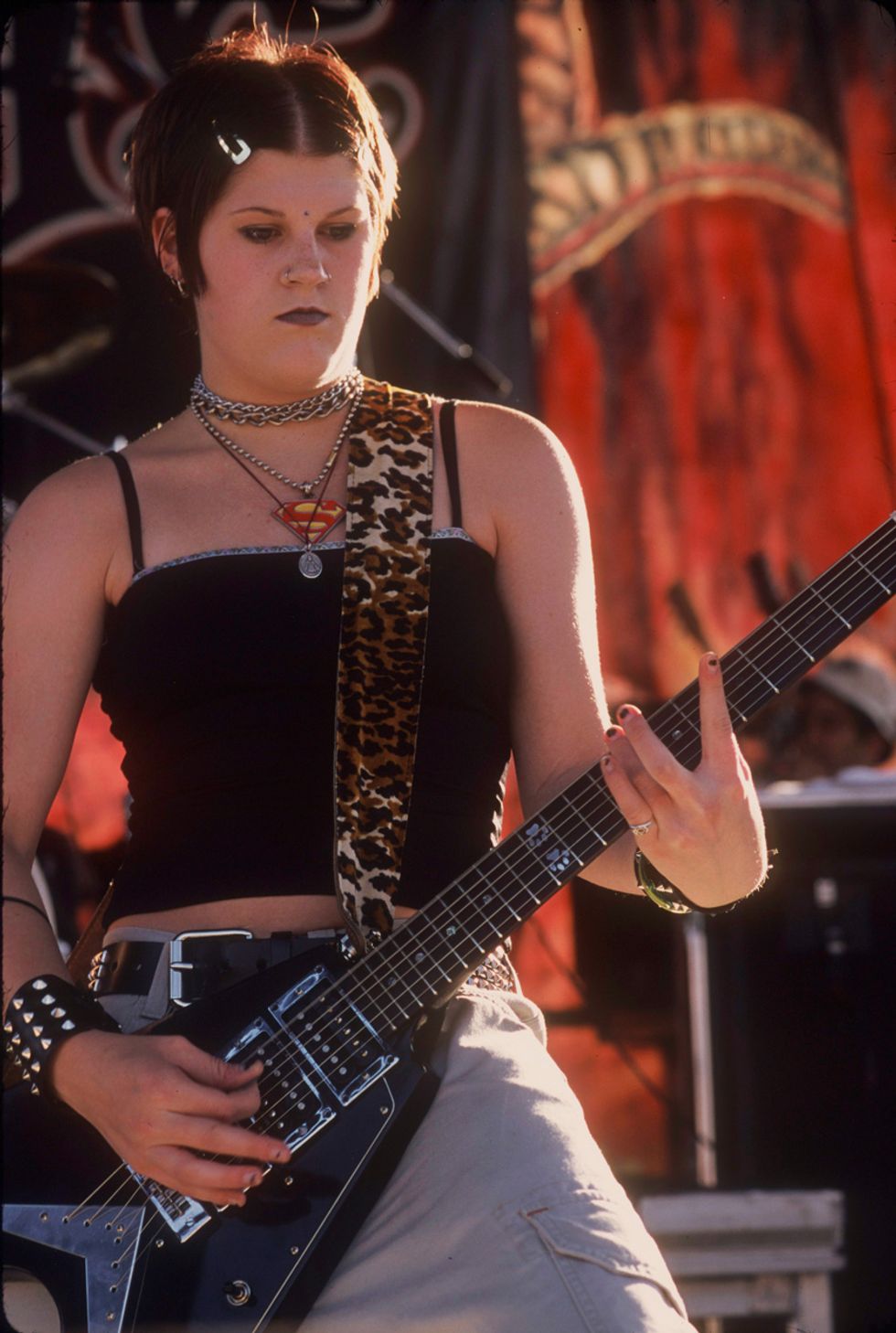
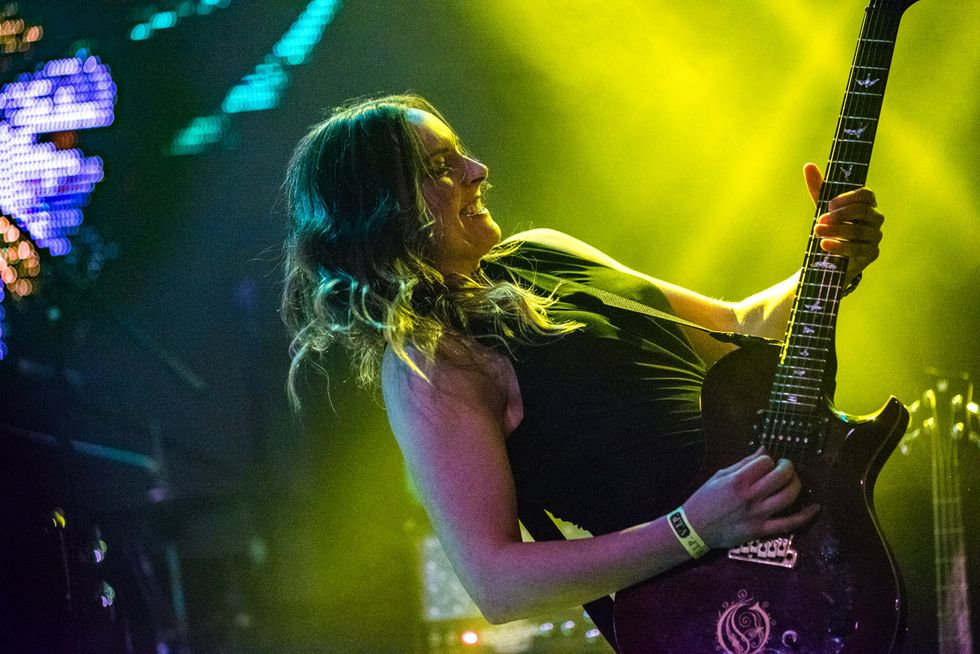








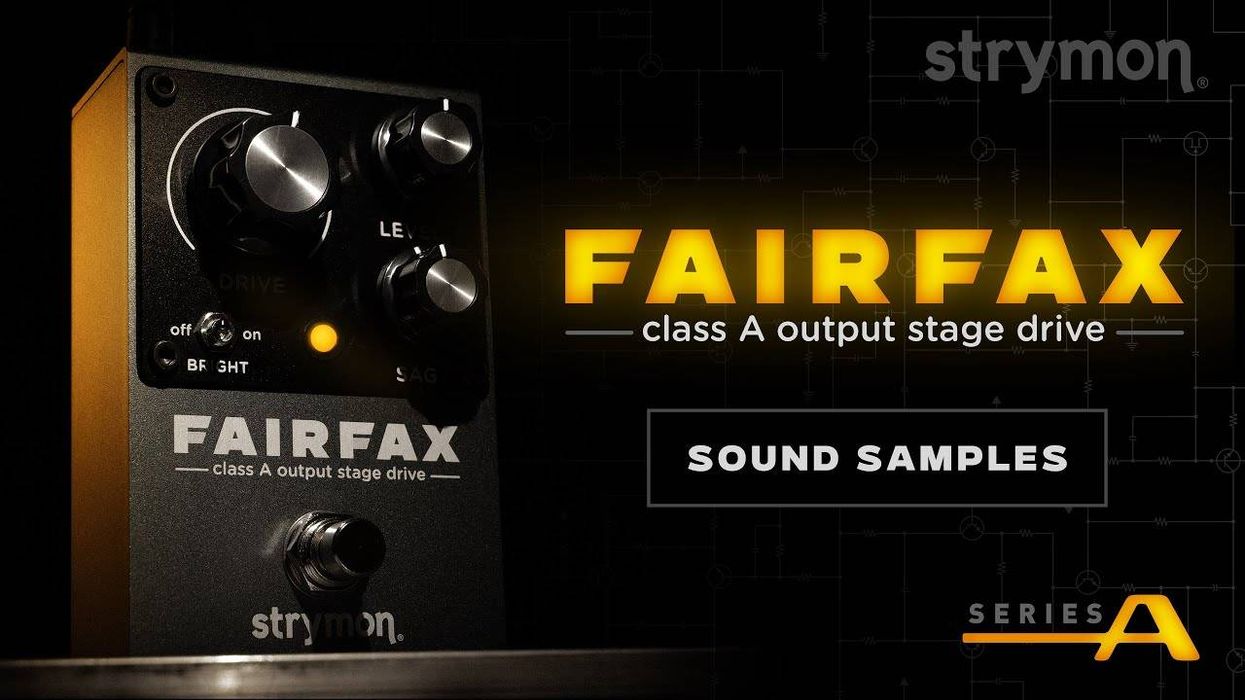
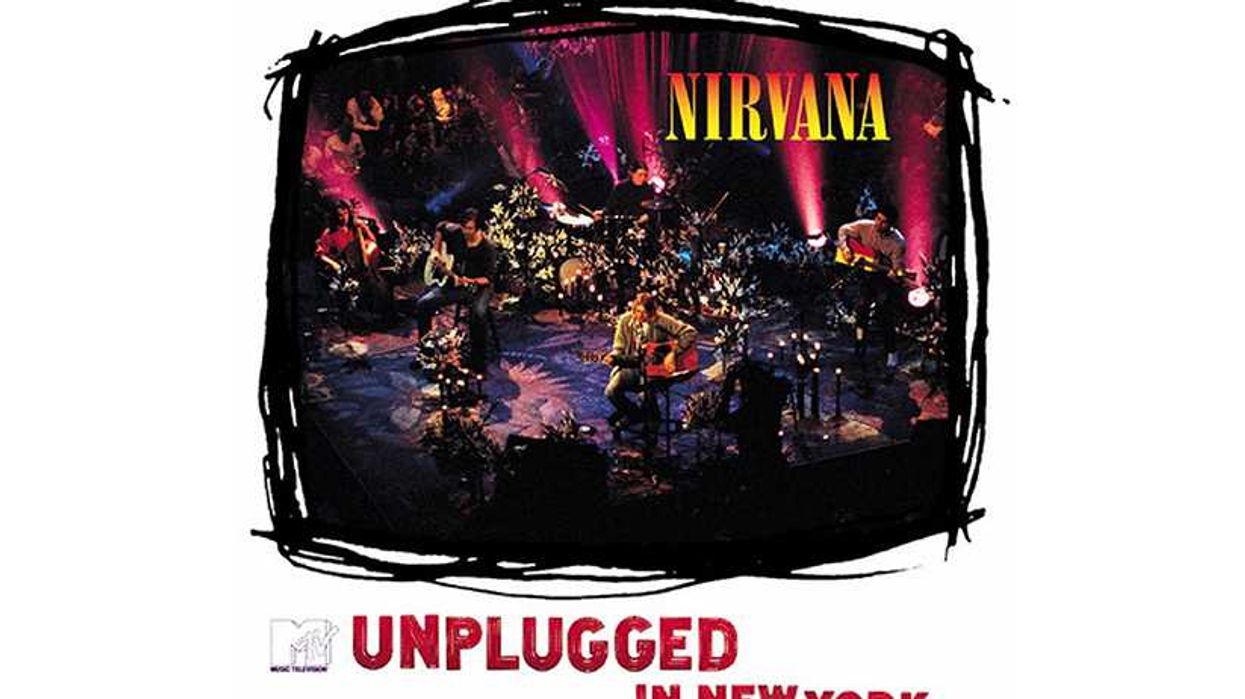

![Rig Rundown: Russian Circles’ Mike Sullivan [2025]](https://www.premierguitar.com/media-library/youtube.jpg?id=62303631&width=1245&height=700&quality=70&coordinates=0%2C0%2C0%2C0)
















![Rig Rundown: AFI [2025]](https://www.premierguitar.com/media-library/youtube.jpg?id=62064741&width=1245&height=700&quality=70&coordinates=0%2C0%2C0%2C0)




















 Zach loves his Sovtek Mig 60 head, which he plays through a cab he built himself at a pipe-organ shop in Denver. Every glue joint is lined with thin leather for maximum air tightness, and it’s stocked with Celestion G12M Greenback speakers.
Zach loves his Sovtek Mig 60 head, which he plays through a cab he built himself at a pipe-organ shop in Denver. Every glue joint is lined with thin leather for maximum air tightness, and it’s stocked with Celestion G12M Greenback speakers.






